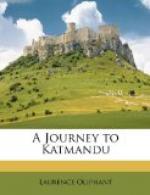Here came dashing along a coach and six, the four leading horses ridden by postilions, while a sporting Baboo drove the wheelers, and two more sporting friends sat inside, and outriders vociferously cleared the way. Here two of the King’s eunuchs jogged along in great style on camels with gaudy trappings; after them came prancing steeds bearing some gorgeously-dressed young princes, and then innumerable elephants bearing all sorts of disreputable-looking characters, the gents and blacklegs of the Lucknow community. In fact, I recognised specimens of nearly all the various classes of society which are to be met with at races in England, except that none of the fair sex were to be seen on this occasion.
There can be no doubt that Lucknow is a fast place, and contains a very sporting population; and, if I remember right, the winning horse was the property of the turbaned owner of a four-in-hand.
As in duty bound, we explored the whole city, but a correct idea of the edifices with which it abounds is only to be gained from the drawings, which are executed by the natives with the most delicate minuteness, and convey a very correct notion of the exterior of the handsome mosques, minarets, tombs, and palaces, which render Lucknow a most interesting locality.
The Imaum Bara is said to contain the largest arched room in the world, a fact which we very much doubted. The “Gate of Constantinople” is handsome; not so La Martinere, an attempt at an Italian villa, the figures on the roof of which look as much out of keeping with the rest of the edifice as the building itself looks out of place planted in the midst of paddy-fields; it was erected by General Claude Martine, originally a French grenadier, and it is now, according to his express intentions, devoted to educational purposes.
One cannot but be struck by the singular taste of eastern potentates, who are so much more careful to provide a handsome place for their reception when dead than they are for their residence while alive. Were I the King of Oudh I should immediately move into the handsome tomb at present vacant, and leave directions to be buried in my palace.
A night’s journey took us to Cawnpore, one of the largest and most disagreeable-looking stations in India. Here I resumed my acquaintance with the great trunk road under more favourable circumstances, and was not a little pleased to find how rapidly I was approaching Delhi. The carriage in which I travelled was a small palanquin on wheels, which one horse dragged along with ease; and as the stages were short, and the road very good, he was generally put into a hand-gallop at starting, and kept his pace up for the five or six miles allotted to him.
The great number of carts we passed confirmed me in thinking that this was the proper line for an experimental railway. The country is here well cultivated throughout; there is no water-carriage to contend against, and the present means of conveying goods is lamentably slow and expensive. The formation of the country affords every facility for the construction of a railway, being perfectly level throughout; whereas between Calcutta and Benares, the Rajmahal hills have to be traversed: besides these many advantages, this line would be attended with a pecuniary saving to the Government, as the two or three military stations now on this road might be abolished.




